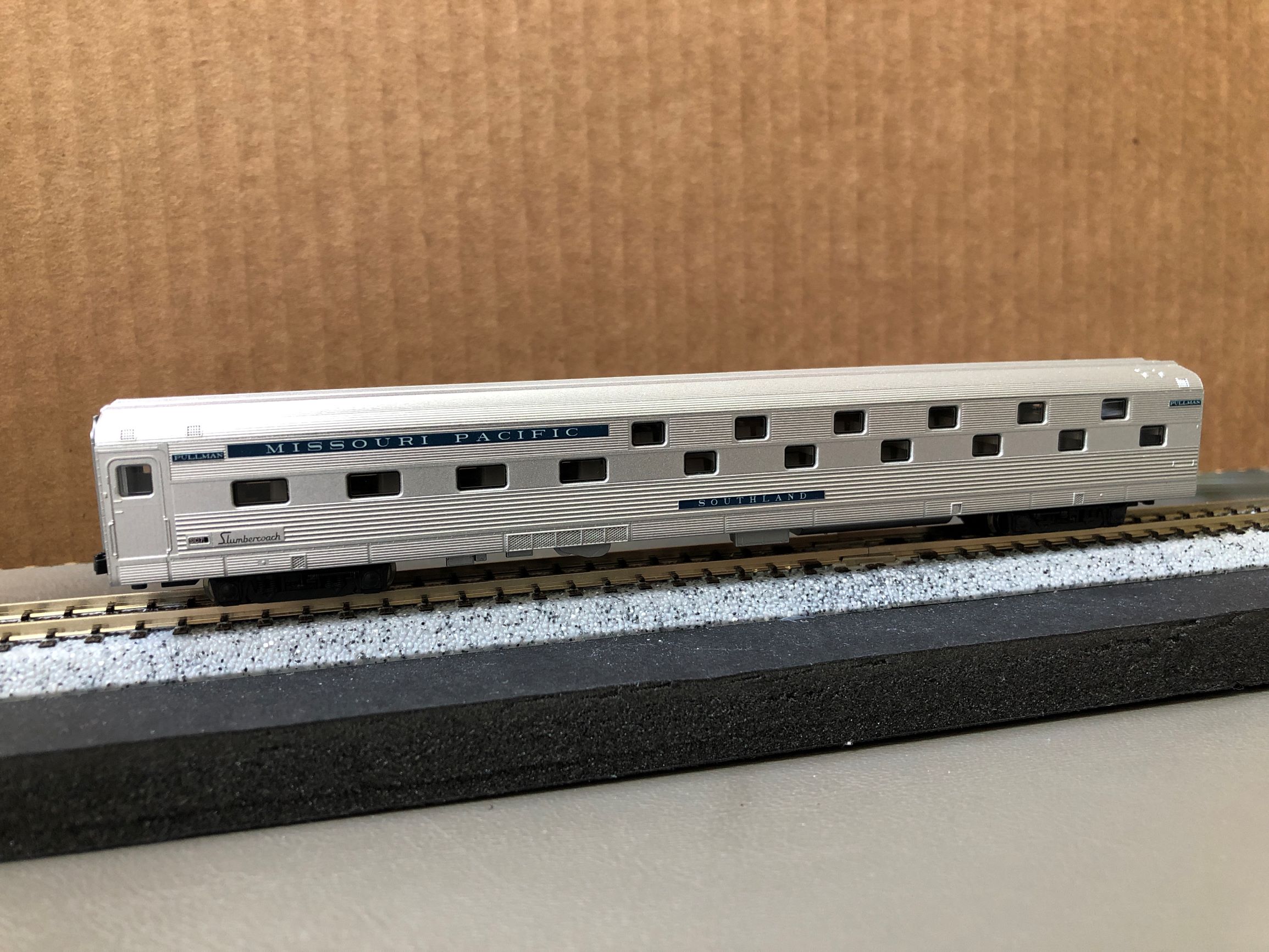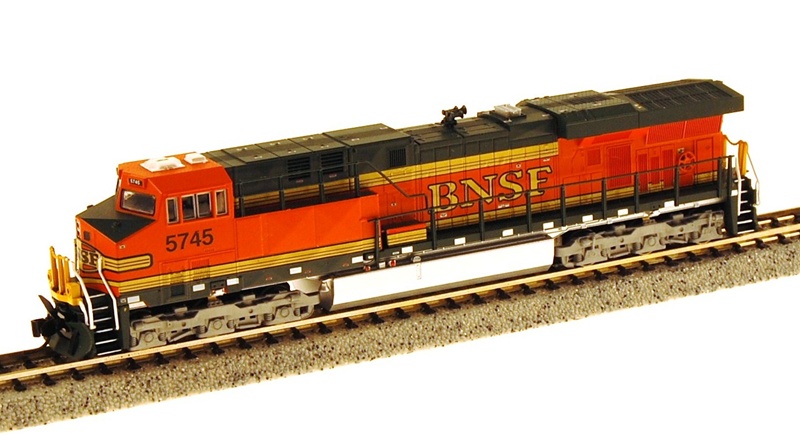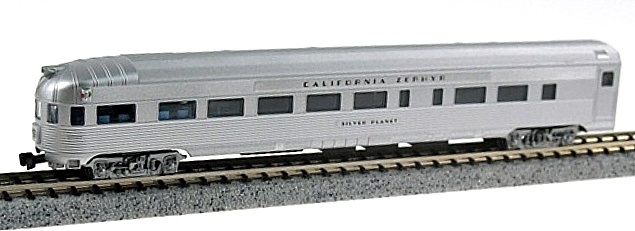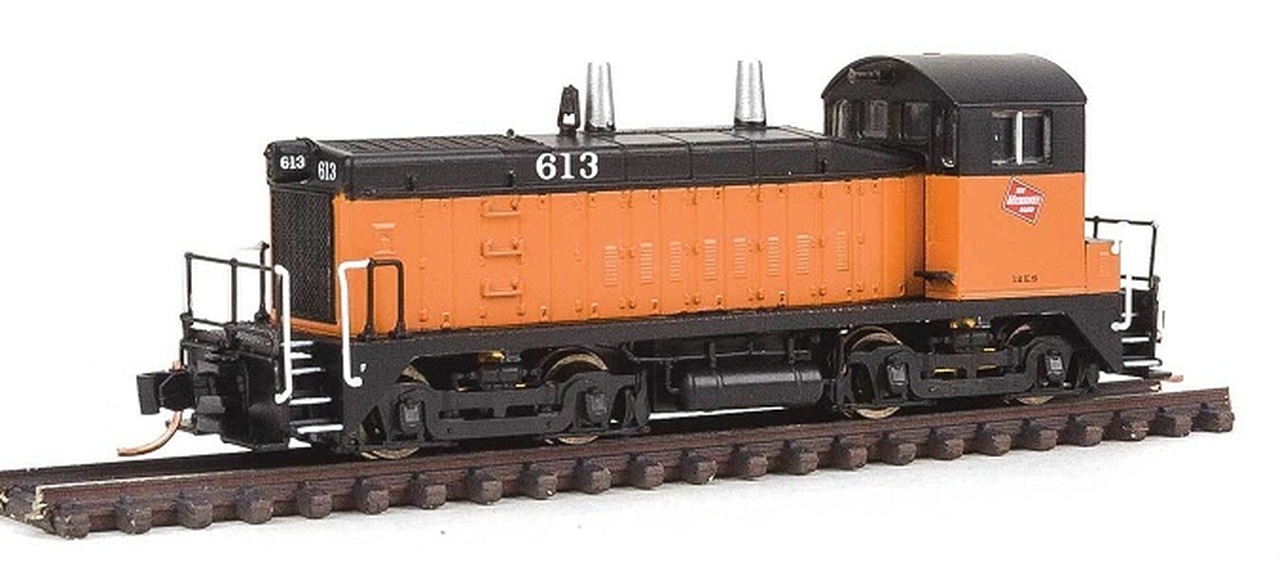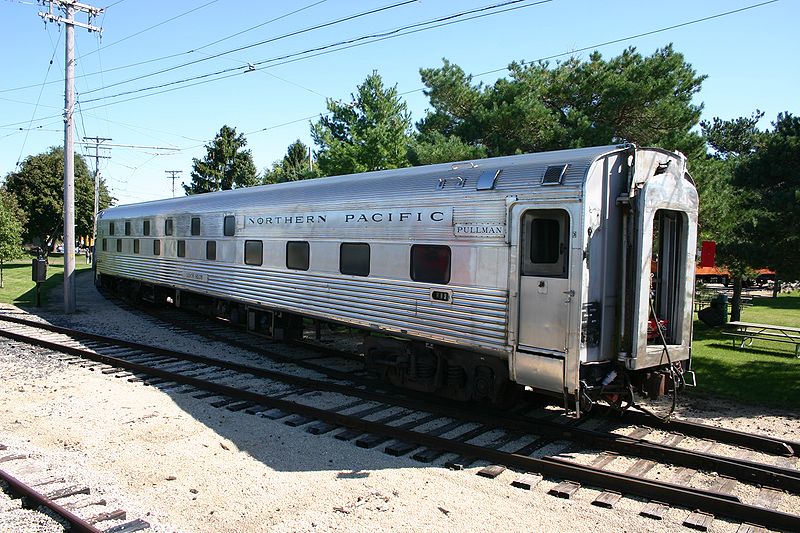Specific Item Information: Kato Parts Dept Parts Kit Special
Built 1959 for Missouri Pacific as #699 "Southland" then bought by Northern Pacific and ran as #329 "Loch Tarbet". Ran by Amtrak as number 2090 after conversion to HEP. Current location: Museum of the American Railroad, Frisco, Texas.
Built 1959 for Missouri Pacific as #699 "Southland" then bought by Northern Pacific and ran as #329 "Loch Tarbet". Ran by Amtrak as number 2090 after conversion to HEP. Current location: Museum of the American Railroad, Frisco, Texas.
Prototype History: The Slumbercoach is an 85-foot-long, 24 single room, eight double room streamlined sleeping car. Built in 1956 by the Budd Company for the Chicago, Burlington and Quincy Railroad for service on the Denver Zephyr, subsequent orders were placed in 1958 and 1959 by the Baltimore and Ohio Railroad and Missouri Pacific Railroad for the Texas Eagle/National Limited, then in 1959 by the Northern Pacific Railway for its North Coast Limited and also the New York Central Railroad for use on the 20th Century Limited.
The Slumbercoach, in economic terms, was part of the American railways’ attempt, in the 1950s, to recapture market share lost to airlines, buses and the automobile by providing upgraded accommodations for non-first class passengers. Demand for private accommodation (bedrooms and roomettes) remained high, while demand for the traditional Pullman open section was declining. Other types of economy sleeping car did not have the capacity of the Slumbercoach: sixteen duplex roomette-four double bedroom car slept only 24, while the traditional sixteen section tourist Pullman slept 32. Thus, the Slumbercoach, sleeping 40, allowed railways to offer coach passengers private sleeping car accommodation at little more than coach fare. In its first year of using Slumbercoaches on the North Coast Limited, the Northern Pacific Railway averaged a 27 (out of 32 available) room occupancy rate, and a 34 (out of 40 at full capacity) passenger occupancy rate." From Wikipedia
The Slumbercoach, in economic terms, was part of the American railways’ attempt, in the 1950s, to recapture market share lost to airlines, buses and the automobile by providing upgraded accommodations for non-first class passengers. Demand for private accommodation (bedrooms and roomettes) remained high, while demand for the traditional Pullman open section was declining. Other types of economy sleeping car did not have the capacity of the Slumbercoach: sixteen duplex roomette-four double bedroom car slept only 24, while the traditional sixteen section tourist Pullman slept 32. Thus, the Slumbercoach, sleeping 40, allowed railways to offer coach passengers private sleeping car accommodation at little more than coach fare. In its first year of using Slumbercoaches on the North Coast Limited, the Northern Pacific Railway averaged a 27 (out of 32 available) room occupancy rate, and a 34 (out of 40 at full capacity) passenger occupancy rate." From Wikipedia
Road Name History: 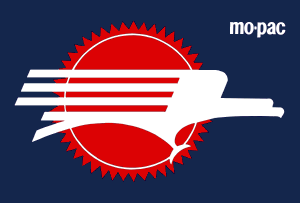 The Missouri Pacific Railroad (reporting mark MP), commonly abbreviated MoPac, with nickname of The Mop, was one of the first railroads in the United States west of the Mississippi River. MoPac was a Class I railroad growing from dozens of predecessors and mergers, including the St. Louis, Iron Mountain and Southern Railway (SLIMS), Texas and Pacific Railway (TP), Chicago and Eastern Illinois Railroad (C&EI), St. Louis, Brownsville and Mexico Railway (SLBM), Kansas, Oklahoma and Gulf Railway (KO&G), Midland Valley Railroad (MV), San Antonio, Uvalde and Gulf Railroad (SAU&G), Gulf Coast Lines (GC), International-Great Northern Railroad (IGN), New Orleans, Texas and Mexico Railway (NOTM), Missouri-Illinois Railroad (MI), as well as the small Central Branch Railway (an early predecessor of MP in Kansas and south central Nebraska), and joint ventures such as the Alton and Southern Railroad (AS).
The Missouri Pacific Railroad (reporting mark MP), commonly abbreviated MoPac, with nickname of The Mop, was one of the first railroads in the United States west of the Mississippi River. MoPac was a Class I railroad growing from dozens of predecessors and mergers, including the St. Louis, Iron Mountain and Southern Railway (SLIMS), Texas and Pacific Railway (TP), Chicago and Eastern Illinois Railroad (C&EI), St. Louis, Brownsville and Mexico Railway (SLBM), Kansas, Oklahoma and Gulf Railway (KO&G), Midland Valley Railroad (MV), San Antonio, Uvalde and Gulf Railroad (SAU&G), Gulf Coast Lines (GC), International-Great Northern Railroad (IGN), New Orleans, Texas and Mexico Railway (NOTM), Missouri-Illinois Railroad (MI), as well as the small Central Branch Railway (an early predecessor of MP in Kansas and south central Nebraska), and joint ventures such as the Alton and Southern Railroad (AS).
In 1967, the railroad operated 9,041 miles of road and 13,318 miles of track, not including DK&S, NO&LC, T&P and its subsidiaries, C&EI and Missouri-Illinois.
On January 8, 1980, the Union Pacific Railroad agreed to buy the Missouri Pacific Railroad. Lawsuits filed by competing railroads delayed approval of the merger until September 13, 1982. After the Supreme Court denied a trial to the Southern Pacific, the merger took effect on December 22, 1982. However, due to outstanding bonds of the Missouri Pacific, the merger with Union Pacific become official only on January 1, 1997.
Read more on Wikipedia.

In 1967, the railroad operated 9,041 miles of road and 13,318 miles of track, not including DK&S, NO&LC, T&P and its subsidiaries, C&EI and Missouri-Illinois.
On January 8, 1980, the Union Pacific Railroad agreed to buy the Missouri Pacific Railroad. Lawsuits filed by competing railroads delayed approval of the merger until September 13, 1982. After the Supreme Court denied a trial to the Southern Pacific, the merger took effect on December 22, 1982. However, due to outstanding bonds of the Missouri Pacific, the merger with Union Pacific become official only on January 1, 1997.
Read more on Wikipedia.
Brand/Importer Information: KATO U.S.A. was established in 1986, with the first U.S. locomotive model (the GP38-2, in N-Scale) released in 1987. Since that time, KATO has come to be known as one of the leading manufacturers of precision railroad products for the modeling community. KATO's parent company, Sekisui Kinzoku Co., Ltd., is headquartered in Tokyo, Japan.
In addition to producing ready-to-run HO and N scale models that are universally hailed for their high level of detail, craftsmanship and operation, KATO also manufactures UNITRACK. UNITRACK is the finest rail & roadbed modular track system available to modelers today. With the track and roadbed integrated into a single piece, UNITRACK features a nickel-silver rail and a realistic-looking roadbed. Patented UNIJOINERS allow sections to be snapped together quickly and securely, time after time if necessary.
The Kato U.S.A. office and warehouse facility is located in Schaumburg, Illinois, approximately 30 miles northwest of Chicago. All research & development of new North American products is performed here, in addition to the sales and distribution of merchandise to a vast network of wholesale representatives and retail dealers. Models requiring service sent in by hobbyists are usually attended to at this location as well. The manufacturing of all KATO products is performed in Japan.
Supporters of KATO should note that there is currently no showroom or operating exhibit of models at the Schaumburg facility. Furthermore, model parts are the only merchandise sold directly to consumers. (Please view the Parts Catalog of this website for more specific information.)
In addition to producing ready-to-run HO and N scale models that are universally hailed for their high level of detail, craftsmanship and operation, KATO also manufactures UNITRACK. UNITRACK is the finest rail & roadbed modular track system available to modelers today. With the track and roadbed integrated into a single piece, UNITRACK features a nickel-silver rail and a realistic-looking roadbed. Patented UNIJOINERS allow sections to be snapped together quickly and securely, time after time if necessary.
The Kato U.S.A. office and warehouse facility is located in Schaumburg, Illinois, approximately 30 miles northwest of Chicago. All research & development of new North American products is performed here, in addition to the sales and distribution of merchandise to a vast network of wholesale representatives and retail dealers. Models requiring service sent in by hobbyists are usually attended to at this location as well. The manufacturing of all KATO products is performed in Japan.
Supporters of KATO should note that there is currently no showroom or operating exhibit of models at the Schaumburg facility. Furthermore, model parts are the only merchandise sold directly to consumers. (Please view the Parts Catalog of this website for more specific information.)
Item created by: chaskunz on 2020-05-10 17:13:19. Last edited by chaskunz on 2020-05-10 17:39:22
If you see errors or missing data in this entry, please feel free to log in and edit it. Anyone with a Gmail account can log in instantly.
If you see errors or missing data in this entry, please feel free to log in and edit it. Anyone with a Gmail account can log in instantly.


